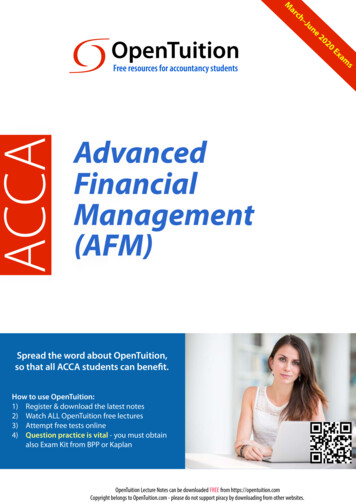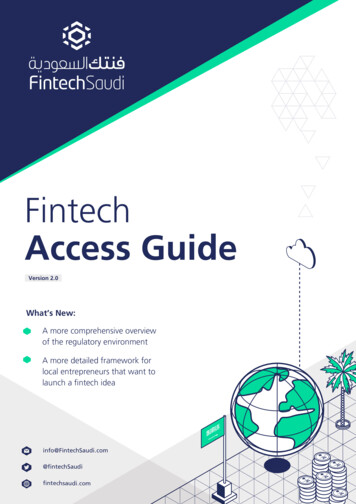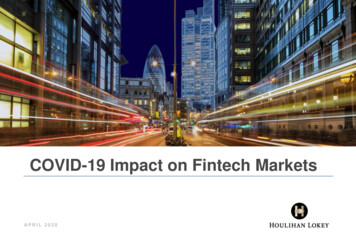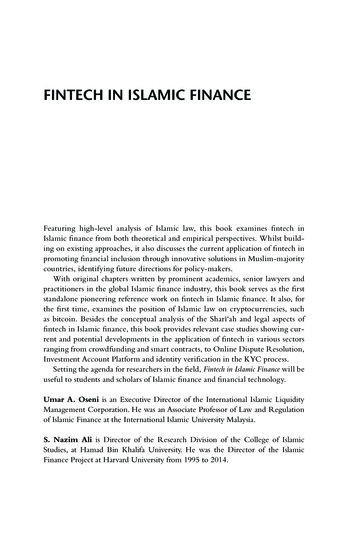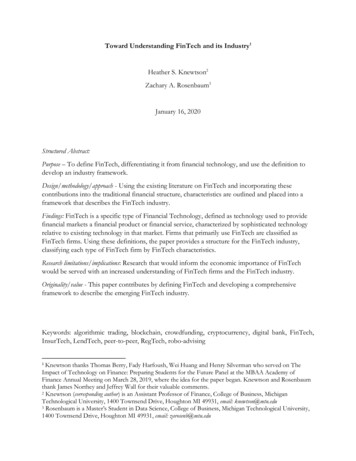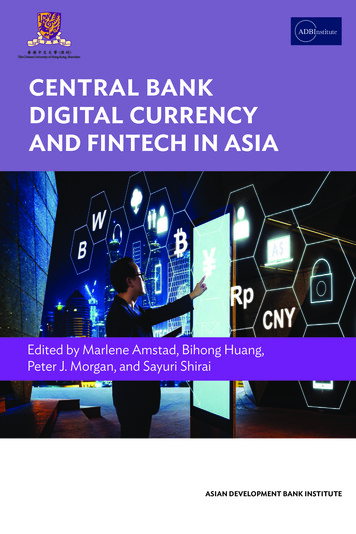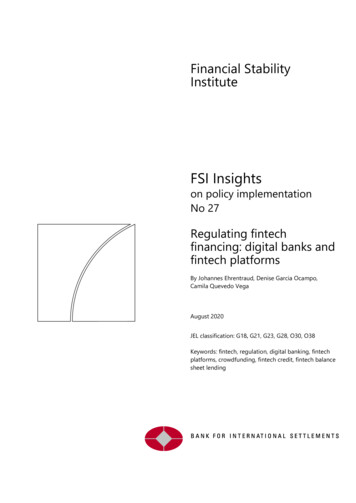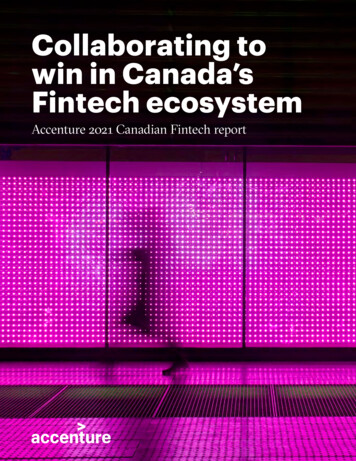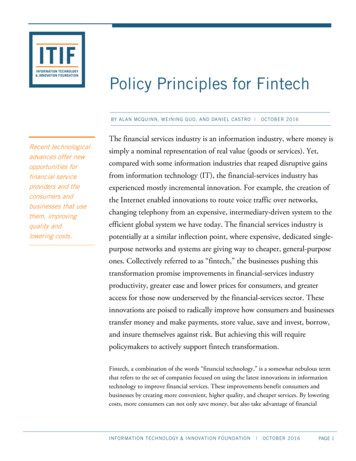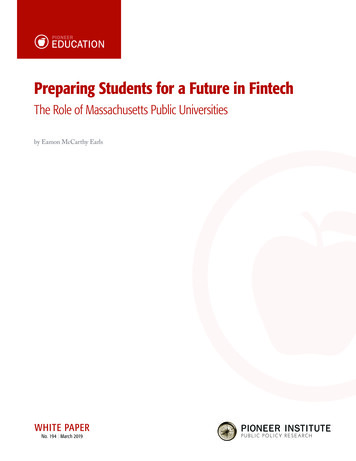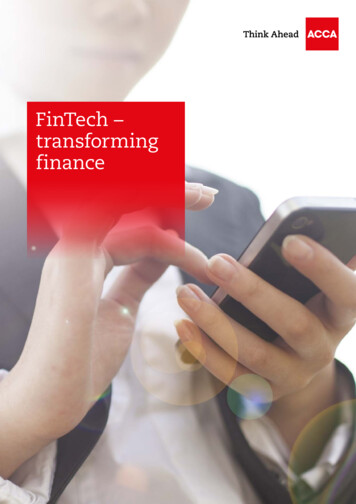
Transcription
FinTech –transformingfinance
About ACCAACCA (the Association of Chartered Certified Accountants) isthe global body for professional accountants. It offersbusiness-relevant, first-choice qualifications to people ofapplication, ability and ambition around the world who seeka rewarding career in accountancy, finance and management.ACCA supports its 188,000 members and 480,000 studentsin 181 countries, helping them to develop successful careersin accounting and business, with the skills required byemployers. ACCA works through a network of 95 offices andcentres and more than 7,110 Approved Employersworldwide, who provide high standards of employee learningand development. Through its public interest remit, ACCApromotes appropriate regulation of accounting and conductsrelevant research to ensure accountancy continues to grow inreputation and influence.The report exploresthe transformationunderway as a result ofthe continued expansionof FinTech and its ongoingimpact across the financialservices landscape.Founded in 1904, ACCA has consistently held unique corevalues: opportunity, diversity, innovation, integrity andaccountability. It believes that accountants bring value toeconomies in all stages of development and seek to developcapacity in the profession and encourage the adoption ofglobal standards. ACCA’s core values are aligned to theneeds of employers in all sectors and it ensures that, throughits range of qualifications, it prepares accountants forbusiness. ACCA seeks to open up the profession to peopleof all backgrounds and remove artificial barriers, innovatingits qualifications and delivery to meet the diverse needs oftrainee professionals and their employers.In June 2016 ACCA formed a strategic alliance withChartered Accountants Australia and New Zealand (CA ANZ).The alliance represents the voice of 788,000 members andfuture professional accountants around the world, who sharethe commitment to uphold the highest ethical, professionaland technical standards.More information is available at: www.accaglobal.comACKNOWLEDGEMENTSThis report was prepared with the help of:Yoni Assia, Founder and CEO, eToroSteve Bailey, Founder, Carbon ArchitectureDavid Barnes, Global Managing Director for Public Policy,DeloitteRichard Brown, Partner, Santander InnoVenturesTaavet Hinrikus, Co-founder, TransferWiseAlastair Lukies, Chairman, Innovate FinanceJulie Meyer, Managing Partner, Ariadne CapitalBivek Sharma, Partner and Head of Small BusinessAccounting, KPMG The Association of Chartered Certified AccountantsSeptember 2016Dr Dominik Steinkuehler, Co-founder and Group ManagingDirector, LendicoMichael Wood, Co-founder, Receipt Bank
Foreword3Technology has become the driving forcebehind many changes to society and theglobal economy. That technology hascaused the rapid and continuousdisruption of a succession of industries is agiven. In the financial services industry, withthe growth of financial technology(FinTech), we are witnessing significanttransformations to systems and processesthat had stood the test of time. Whatmakes FinTech so potentiallytransformative is the scope for materiallyaltering the fundamentals underpinningthe applications that make up thebackbone of our commercial lives.A range of systems and processes in areasincluding payment, lending, retail banking,asset management, fraud protection andregulatory compliance are now populatednot just by well-known and establishedinstitutions but also by challenger start-upsvying for a say in the future. These newentrants, alongside reconfiguringincumbents, are reformulating servicedesign and delivery through technologicaldevelopments and advancements insoftware, user experience and data mining.At the same time, regulators around theworld, operating in countries whosefinancial services sector is in varying stagesof development, must find the rightbalance between harnessing thepossibilities offered by FinTech and theright level of forward looking legislation togive it the best chance of flourishing.Fintech – transforming finance – exploresthe features of this new landscape,highlighting the many ways in which thisrevolution is taking place. For professionalaccountants, this new terrain will providemany opportunities as it permeates deeperand deeper into the fabric of society.From the promise of blockchain, to thedemands of valuation in a digital era,finance more than ever needs anexperienced, knowledgeable guide tomake the most of the opportunities ahead.Ng Boon YewExecutive Chairman,Raffles Campus Pte Ltdand Chairman, ACCAAccountancy Futures Academy
Executive summaryFinancial Technology (FinTech)is here – sweeping throughfinance and, if some proponentsare to be believed, threateningtraditional edifices that havestood for centuries.Financial Technology (FinTech) is here– sweeping through finance and, if someproponents are to be believed, threateningtraditional edifices that have stood forcenturies. This great surge is being frontedby a host of new start-ups taking their leadfrom the big tech innovators. Theirmaverick approach is helping to push theFinTech industry into new territory acrossthe financial services landscape, raisingbillions of dollars and worrying theincumbents. So what are the main trendsand driving forces shaping FinTech today?FinTech start-ups span the spectrum offinancial services, from lending andadvice to foreign exchange andpayments. One aspect that many of themshare is strong growth: thousands of percent in some cases. Not surprisingly, thishas been attracting attention from investors.And as technologies evolve at pace (didsomeone say blockchain?), the potentialfor further disruption is ever present.New technology means new banks.Without the need for bricks, mortar or evenphysical money, many start-ups arechanging perceptions of what a bank can,and should, be. Many of these new bankshave appeared in the UK, owing to thecountry’s FinTech pull. FinTech is changingnot only how banks operate, but also theway people invest. By sidelining financialadvisers, FinTech firms reduce the cost ofinvesting and make it simpler.Cryptocurrencies such as bitcoin arepresaging deeper disruption. Thetechnology that underpins bitcoin –blockchain – could transform the way inwhich many financial transactions areconducted. From trading shares to wiring4remittances, intermediaries, upon whosesecurity and technology everyone oncerelied, are becoming redundant.Some commentators believe the banksare finished, while others see this astheir chance to fight back. Most bigbanks lack the agility of smaller rivals andstill rely on legacy IT systems that areoutmoded and unwieldy. Nevertheless,they are also trying to adjust to thepotential of FinTech by acquiringchallengers, or, increasingly, finding waysto collaborate with nimbler new entrants.Regulation could turn out to work in thebanks’ favour. The FinTech upstarts face araft of legislation that, depending onjurisdiction, limits what they can do.Nonetheless, regulation itself is underconstant review and some countries,including the UK, are supporting innovatorsand entrepreneurs – and the banks – asthey navigate the rules. The RegulationTechnology (RegTech) sector, made up offirms that provide technology solutions toenable better compliance with regulatoryrequirements, is also set to play asignificant role in redefining the landscape.For professional accountants, helpingcompanies manage the regulatory, taxand financial implications of the FinTechsurge offers considerable opportunity.The banks and many professionalaccountancy firms are starting to adapt.Like the rest of the financial services sector,all professional accountants and otherfinance professionals will need to engagewith the wider opportunities presented bythe digitisation shift and continue toprovide analysis that helps companiesunderstand the value they are creating.
1. This is an evolutionTech-enabled disintermediationof finance is responding to pentup demand for change.FinTech is already big business. Accordingto Accenture, investment in global FinTechgrew by 75% in 2015 to 22.3bn (Accenture2016). Around the world, FinTechcompanies exist across the entire spectrumof finance. These services include: borrowing money – peer-to-peerlenders such as Lendico, Zopa, Prosperand OnDeck connect savers withborrowers to cut out banks foreign currency – peer-to-peer moneytransfer service TransferWise is themarket leader in the foreign currencyexchange sector international money transfer –innovators here include Xoom, Azimo,and CurrencyFair credit reports – Credit Karma ischallenging Experian in the market forpersonal credit information fraud protection – V-key providesmulti-factor authentication and paymentsecurity solutions for mobile applications payments/e-commerce – Klarna ischanging internet retail with a uniquepayment proposition that lets consumersreceive goods before they pay fi nancial advice – Scalable Capitalreduces the costs of expensive faceto-face advice by using algorithms tomake decisions about when and inwhat to invest insurance – Trov is an on-demand,app-based insurance provider forpersonal belongings; it forms part of agrowing Insurance Technology(InsurTech) sector.5All this action is worrying incumbentswhose long unchallenged run hasweakened their ability to adapt and evolveeffectively, as emerging technologies do tofinance what they have already done to arange of other industries. As with othersectors, this fertile period of tech-enableddisintermediation of finance is respondingto pent-up demand for change in a part ofthe economy that has been resistant toaltering the status quo.GEOMETRIC, NOT ARITHMETIC,GROWTHThe term ‘exponential growth’ is oftenused to characterise the FinTechlandscape’s extremely rapid success stories– and rising valuations. For example, Lufaxis a Chinese peer-to-peer lender foundedin 2012. It made loans of 24m in year one, 538m in year two, and 2.3bn in year three(Jones 2014). At its peak, that represents2100% growth. In 2015, Lufax surpassed10m registered users and in January 2016,after its most recent funding round, wasvalued at 18.5bn.Exponential growth is a profound concept.Intel founder Gordon Moore forecast in the1960s that computer chips would double intransistor density every two years. For 50years, ‘Moore’s Law’ has held true. Theprinciple is visible in many science and techfields. The cost of computer storage, thecost of sequencing a base pair of DNAmolecules, the price of bandwidth – theseand other metrics are examples of howexponential growth in processing powerhas cut costs.‘Look at Netflix. Blockbuster [a video hiring chain] was huge! And now? Gone.Spotify is doing the same in the music industry. The established playersalways say, “We are safe, nothing can touch us”’.Dr Dominik Steinkuehler, Co-founder and Managing Director, Lendico‘People are used to dealing with linear growth. When a company likeTransferWise has 1% of FX transactions in Europe, people say ‘that’s nothing’.But it, like Receipt Bank, is growing exponentially. That 1% becomes a hugenumber in a short space of time. The compound interest fools people’.Michael Wood, Co-founder, Receipt Bank
2. New banks are launchingA sign of the growing maturityof FinTech is the emergenceof app-based, user designfocused banks.A sign of the growing maturity of FinTech isthe emergence of new banks. The logic isattractive: a bank that starts from groundzero can use the latest technology andbusiness models. By contrast, high streetbanks are encumbered by a branchnetwork, legacy software and systems. Inpractice, launching a bank is hard and doesnot rely on new technology alone: there arealso regulatory hurdles to overcome. It hadbeen 100 years since the UK had last issueda new banking licence when newcomerMetro Bank began trading in 2010.Today, banking provision has movedbeyond physical branches. Open-accessplatforms allow software developers tocreate their own apps and straight-throughprocessing for a highly automated loanprocess. An example is Fidor Bank, a digitalbank founded in Germany, which operates‘online-only’. Fidor has a set of ApplicationProtocol Interfaces (APIs) that allowsoftware developers to become partnersand build services and tools that link intoFidor’s platform. This enhances Fidor’s offerby, for example, providing crowdfinance,peer-to-peer (P2P) lending andcryptocurrency services on top of a bankaccount. This approach seems to beworking, given that by the time it launchedin the UK in 2016 Fidor had alreadyamassed 100,000 customers since its 2009debut. Fidor recently announced that it hadbeen acquired by France’s second largestbank, Groupe BPCE, a move that will tosupport its international expansion plans.6The UK is home to a number of online-onlybank start-ups. Atom Bank, led by theformer chief executive of First Direct Bankand the co-founder of Metro Bank, is amobile-app-based bank: it has no callcentre, no branches. It also boasts a recent 45m investment from Spanish bank BBVA.Atom is by no means alone and is launchingin the UK against at least four rivals:Mondo, Starling, Tandem and Secco, eachof which offers a unique take on banking.Tandem Bank, which secured FinancialConduct Authority (FCA) and PrudentialRegulation Authority (PRA) accreditation inNovember 2015, provides a good exampleof how the new breed of banks are settingthemselves apart. Created by a co-founderof FinTech remittance service providerAzimo and a former Capital One Bankdirector, Tandem is committed to creatingan app-based retail banking serviceproposition that is personalised to help itsusers identify money-saving opportunities.This is in marked contrast to the traditionalUK retail banking sector that it ischallenging, which is more commonlyassociated with vigorous sales tactics andsuboptimal customer experiences. Tandemhosts regular events, such as ‘build it breakit breakfasts’, and has a community of over5,000 ‘co-founders’ who have signed up tocontribute to the co-design of the idealbanking experience. Demonstrating itspopularity, it also raised 2.3 million througha crowdfunding campaign that reached 850,000 within 10 seconds of its launch.
3. London is a key player,but keep an eye on Asia7There are many FinTech centres aroundthe world but global progress is disjointed– some jurisdictions are powering ahead,while others are emerging and gatheringpace. According to accountancy firm EY,the four core attributes required for aFinTech ecosystem to thrive are: poolsof high-quality talent; availability of a mixof financial resources; the right type ofpolicy support; and enough end userdemand (EY 2016).Pools of high-quality talent;availability of a mix of financialresources; the right type ofpolicy support and enough enduser demand allow FinTechcentres to thrive.Currently, the US dominates the landscape,thanks to California – the home of theglobal technology sector – and New York.China and India have begun to draw inmore investment, 4.2bn in 2015, tochallenge North America’s dominance.Singapore has also become a majorFinTech hub in Asia-Pacific as both aregional base for global FinTech firms andfor national start-ups. In May 2016, theMonetary Authority of Singapore (MAS)and the FCA signed a cooperationagreement, referred to as a ‘FinTechbridge’. This agreement sets out how thetwo authorities can share knowledge aboutengagement with certain types of companyand co-design innovative approaches thathelp nurture, develop and internationaliseFinTech businesses.Yet despite the near-term uncertainty castover the city by the UK’s recent referendumon EU membership, it is London’scontinued status as a global financialcentre and growing relevance as a techentrepreneurship hub, combined with thecountry’s disposition towards adopting newtechnology, that has seen London cementits position as a leading centre for FinTech.In 2015, UK-based companies raised 962m (KMPG 2016). Eileen Burbidge,partner at Passion Capital, a VC firm andHM Treasury’s special envoy for FinTech,noted of London: ‘The city has becomesuch a tech powerhouse because it excelsover other tech hubs around the world.London combines the technology anddigital innovation of Silicon Valley with theWall Street financing heritage of New Yorkand the policymaking of Washington DC –all in one phenomenal city’.Elsewhere, countries such as theNetherlands, Sweden, Germany andIsrael have become highly developedFinTech hubs. eToro, for example, a global‘social trading’ network, has establisheddivisions in multiple territories, includingRussia and China.Figure 3.1: FinTech VC investment 2015 (US )United Africa55mSource: KPMG 2016, Tracxn 2016, Finextra 2016South East Asia151m
FinTech – transforming financeAs the final outcomeof the UK’s split fromEurope is as yet unknown,and unlikely to becomedefinitive for at least24 months after formalseparation proceedingshave begun, so too arepossible consequences.London is a key player, but keep an eye on AsiaBREXIT: THE IMPACT ON FINTECH INTHE UKBritain’s referendum decision to leave theEU has sparked many forecasts about theimpact on FinTech. Will Berlin or Amsterdambecome a more attractive home forEuropean FinTech start-ups thanks to theirsingle market access, which a post-leave UKmay end up renouncing? Or, will the UK andLondon keep powering on, unperturbed bythe uncertainty and maybe even buoyed bya newfound internationalism?The truth is likely to sit somewhere betweenthe two extremes of doom and bloom.What is currently certain is that it is too earlyto tell. As the final outcome of the UK’s splitfrom Europe is as yet unknown, and unlikelyto become definitive for at least 24 monthsafter formal separation proceedings havebegun, so too are possible consequences.Two areas for concern are recruitment andregulatory integration. While recruitmentmay become an issue, with FinTech facingsimilar issues to other sectors accustomedto hiring from the EU, the actual final detailof working arrangements are not yetknown. At present, FinTech is estimated toemploy 66,000 people in the UK withapproximately one-third coming fromEurope. London benefits from the UK’sflexible employment arrangements and itsposition as an unrivalled global destinationin which to work and play, but it is alsoafflicted by exorbitant living costs. Although8the final Brexit outcome is some way off, itwould be remiss of companies to fail toplan for the future. Among its memberssurveyed by UK FinTech trade body,Innovate Finance, 47% strongly agreed oragreed that in light of the referendumresult they were considering relocatingjobs and expanding their teams primarilyoutside the UK (Innovate Finance 2016).Secondly, there is the regulatory angle.The possible loss of passporting rights forUK FinTech firms – permission for thosewith banking licences to operate acrossEU borders – is a concern for thoseoperating in multiple European territories.Furthermore, increased regulatoryburden from a lack of harmonisation incertain areas, including data legislationand payment services, could dampengrowth prospects, add costs and lesseninvestor appetite.These potential downsides should betempered by positive factors unlikely todisappear overnight that have establishedthe UK as a world-leading FinTech centre.For example, the UK’s regulatoryenvironment, under the auspices of theFCA, is conducive to finding innovative andproactive ways of nurturing the sector. Onbalance, FinTech companies with globalambitions already established in Londonwill probably be undeterred, maintainingLondon’s attractiveness for the industrylong into the future.
4. Asset management is now consumer-friendlyInvestors now have accessvia digital platforms to techenabled investment approachesthat are transforming the sector.In the pre-FinTech era, only a dedicatedminority of consumers had the tools at theirdisposal to understand where their moneywas invested. This has now changed.Availability of financial information, accessvia digital platforms to tech-enabledinvestment approaches and deep reductionsin the fee structures traditionally found inthe industry are transforming the sector. Anumber of FinTech companies, includingwell-known names such as Wealthfront andBetterment, which each hold billions ofdollars of assets under management, haveemerged, offering low-cost advice for retailinvestors. These companies use algorithmsto create diversified portfolios for investorsthat take into consideration their degree ofrisk appetite and automatically rebalanceportfolios to maintain the level of riskwithin defined parameters.Cost is a major selling point as the servicesdramatically undercut human financialadvisers. For example, at British investmentplatform Nutmeg, fees are below 1%,investments can be withdrawn at any timewithout incurring large charges and allinformation about performance and fees iseasily accessible.FinTech is also shifting bargainingpower towards consumers, who nowhave reduced reliance on intermediariesfor information. Alongside a lower cost,direct access to information allowscustomers to get what they need, whenthey need it – changing behaviours andopening up new business models. Forexample, eToro, all trades and portfoliosare open and visible, allowing traders tomimic the top performers.‘Traditionally, you would change your fund manager once every two or threeyears. With eToro, people change who they copy maybe two or three times amonth. When you copy an investor with a great record there are zero fees.No “2 and 20” brokerage’.Yoni Assia, Founder, eToro9
5. Blockchain and the distributed ledgerIt is the distributed ledgerof blockchain that has thepotential to alter the worldof finance radically.Blockchain is the underlying distributedledger technology that underpins Bitcoin – apeer-to-peer currency generated, or ‘mined’,by computers solving mathematical puzzles.It is the distributed ledger of blockchainthat, according to some, has the potentialto alter the world of finance radically.‘A CHAIN OF BLOCKS’The distributed ledger is a database ofassets or transactions that is shared with anetwork so that all parties have their ownidentical copy of the ledger. When achange is made to the ledger, every copyof the ledger across the network isupdated almost simultaneously.In the case of blockchain, each transaction,or database entry, is recorded as a ‘block’of data, and each new block has anencrypted copy of the previous blockwithin it, so connecting the two together.Blocks are then linked together usingcryptographic signatures, creating a ‘chain’of activity or transactions that are timestamped, distributed according to theirnature and tamper-proof.In short, blockchain creates anincorruptible ledger of blocks ofinformation, and the information it storescan be potentially anything, from theownership of works of art, to copyrightinformation and financial transactions.Distributed ledgers can be public orprivate. Bitcoin was based on a publicmodel, so anyone could own a copy of theledger and update it (Rae 2016).‘Blockchain and other newtechnologies will have a markedimpact on financial systems.We want to ensure [that] thosesystems remain trusted, as wellas evolutionary’.David Barnes, Global Managing Directorfor Public Policy, Deloitte10A SOURCE OF FUTURE INNOVATIONIn essence, blockchain has four strengths.1. It is an open book – anyone who hasagreed to join a database underpinnedby blockchain can, without permission,access all the information the databaseincludes, making it easy to investigatewho has done what.2. It is distributed – there can be millions ofcopies, all identical, and each participantmay own one. All copies are updated withnew transactions as they occur, withoutthe approval of a central authority.3. It is secure – updating the blockchaininvolves complex algorithms andchanges made to the ledger areindividually immutable.4. It has low cost – as the blockchain isdistributed over a network and notcontrolled by one single authority,overheads are low.Blockchain could become the digitalinfrastructure for everything fromprocessing payments and trading shares toverification and even land title registration.Some areas of finance appear ripe forblockchain disruption, such as back-officeprocesses. A recent study by AutonomousResearch estimates that within five yearsblockchain could allow for 16bn of costsavings by simplifying back-office andsettlement processes (AutonomousResearch LLP 2016).A modification of the original blockchaintechnology – private, or permissioned,distributed ledgers – goes some way toexplaining the flurry of recent innovationactivity in FinTech. Whereas a publicdistributed ledger, as developed forbitcoin, is visible to everyone and does nothave barriers to participation, privateledgers can be used by a closed group ofparticipants to monitor and recordtransactions among themselves.
6. ‘Old’ banks are striking backThe banks recognise thechallenge and are facing upto the challenge with a mix ofadaptation, acquisition and,increasingly, collaboration.Do FinTech challengers pose a threat tothe high street banks? Their backersclearly believe a niche exists. For somecommentators, the reliability of theincumbent banks is underrated. Thebanks themselves recognise thechallenge and believe they can face it,with a mix of adaptation, acquisition and,increasingly, collaboration.Bank-supported corporate venture capital(CVC) has become one of the tools used tosupport this type of innovation andcollaboration. CVC is direct investment instart-ups that provides sponsor institutionswith a stake in innovative ideas that could,if successful, produce products andservices back to parts of their businesses.A host of institutions, including Citibank,UBS, Barclays and DBS Bank, are using arange of different techniques to engagewith FinTech start-ups. Innovation labs,challenge prizes, venture funds,accelerators and workspace hubs havebeen launched around the world in anattempt to attract and nurture future talentand tap into potential ‘big ideas’. Whateverthe reaction, among all market participants11there is growing acceptance of the needfor partnership, connecting the disruptiveinnovation of FinTech with the benefits thatcome from incumbents’ scale and reach.Can banks adapt fast enough? Opinionsvary along a spectrum, from the moreconservative – who believe banks willremain central – to the doom-mongers whobelieve the end is nigh. Some are confidentthat banks will be able to evolve and havethe incentives and resources to do so.The process of change will be expensive.It has been estimated that IT spending byfinancial services companies will reach 480bn globally in 2016, with more thanhalf of the total spending coming from thebanking sector (IDC 2016). One would behard pressed to find a large financialinstitution that does not have a billiondollar tech infrastructure investment planin place. Deutsche Bank, for example,has committed to a 10-year, multi-billiondollar IT programme with Hewlett Packardto re-engineer its wholesale banking arm.Arguably, all this spending is notnecessarily well directed and the scepticsare not impressed.‘It’s about collaboration, learning, and spreading an entrepreneurial culturein the bank as well as making a financial return. Banks can benefit throughcollaboration. We can bring our huge scale to start-ups. Winning useradoption is a huge challenge for start-ups’.Richard Brown, Partner, Santander InnoVentures‘We’re in the cycle where the Empire Strikes Back, where the Goliathsembrace the Davids’.Julie Meyer, Chief Executive, Ariadne Capital‘I recently saw a job advertisement for a Swiss bank looking for a Fortranprogrammer. It’s [a programming language] that’s not even taught atuniversities anymore’.Dr Dominik Steinkuehler, Co-founder and Managing Director, Lendico
7. Regulation is an obstacleProgressive regulatory practicescombined with a growingRegTech sector are taking ontraditional bottlenecks.Some FinTech companies are findingthemselves caught up in legal wrangles.New banks are facing delays in obtaininglicences. Prohibitive peer-to-peer lendingrules in certain countries have dampenedthe sector’s prospects. For example, in theUS, the 2012 Jumpstart Our BusinessStartup (JOBS) Act, set out to modifysecurities legislation and in so doing allowfor equity-based crowdfunding to begin toachieve its potential. The long-awaitedTitle III of the Act, passed in 2016, whichaims to open up equity crowdfunding morebroadly to retail investors, has beendeemed by some to fall far short ofexpectations (Barnett 2016).Since October 2014, the UK’s FCA hasbeen running its own innovation hub,Project Innovate, to help entrepreneursnavigate these rules. In May 2016, the FCAbegan operation of its regulatory12‘sandbox’, which is referred to as ‘a limitedsafe space’ where firms can experimentwith new products and services without thefear of losses attached to an untestedcommercial launch that could end infailure. This is an approach that is alsobeing applied by MAS in Singapore.The burgeoning RegTech sector is radicallyaltering the way in which regulatoryrequirements are fulfilled. Increasingautomation alongside better interpretationof, and compliance with, a growing numberof regulatory requirements will reducecosts and simplify an area of burgeoningcomplexity. Improved ability to interpretlarge amounts of data is essential foreffective risk management, and RegTechproviders, much like their FinTech peers,can provide lower-cost, intelligentsolutions fit for a data-driven and digitaloperating environment.‘Expanding has not been easy because regulations are different in eachmarket. We had to devise a different regulatory solution in each market. InSouth Africa and the Netherlands we applied for credit licences. In others,like Germany, you need a full banking licence’.Dr Dominik Steinkuehler, Founder and Managing Director, Lendico
8. What does this mean for professionalaccountants and finance
FinTech is already big business. According to Accenture, investment in global FinTech grew by 75% in 2015 to 22.3bn (Accenture 2016). Around the world, FinTech companies exist across the entire spectrum of finance. These services include: borrowing money – peer-to-peer lenders such

